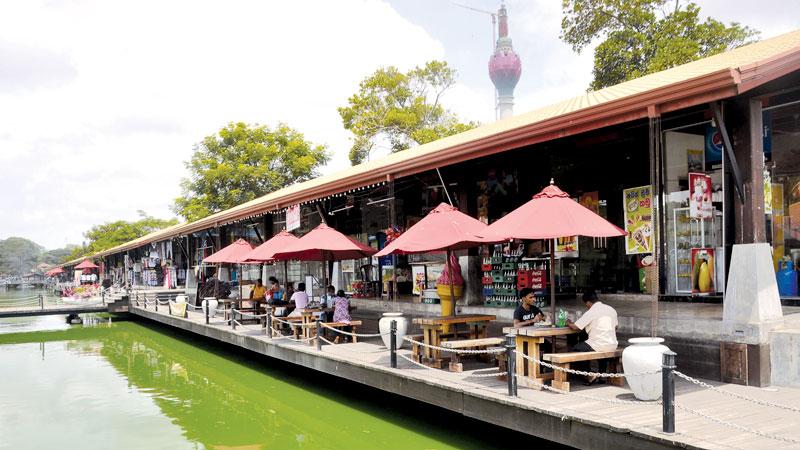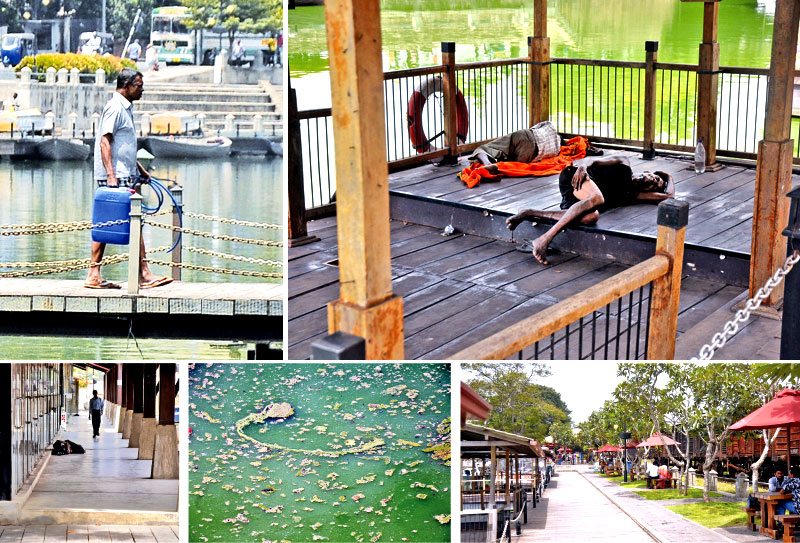
The Pettah Floating Market was supposed to be a dream of urban revival.
A coalition of government agencies, spearheaded by the Ministry of Defence and the Urban Development Authority, poured Rs. 150 million into cleaning up a dirty strip of canal, east of Colombo’s main railway station. They built fountains, shops, and floating platforms.
When it opened in August of 2014, President Maithripala Sirisena, then the Minister of Health, cut the ribbon.
But if the floating market remains a dream today, it’s a bad one.
The water in the canal is bright green, the colour of snot, and it often smells like raw sewage. The fountains sit idle and rusting. Along the waterfront promenade, many shops are vacant, their glass broken.
Homeless people sleep on floating platforms that once housed vendors. And police say it gets even worse at night - the Maradana police last year assigned officers to combat prostitution in the area.
But the business association that represents the floating market’s shopkeepers does not think the dream is completely dead. They believe with some targeted investments, Pettah’s floating market could be brought back from the dead.
A retail wasteland
Talk to any of the shopkeepers still scraping out a living at the floating market, and you’ll hear the same refrain: “no business.”
Ranchit T.M. is the manager of New Royal Wine Stores, which occupies a stall in the back corner of the market. He stood at his counter on a recent afternoon, his shelves full with cans of beer, his shop devoid of customers.
He says he would move his business if he could, but he doesn’t make enough money to do it. “There’s no business here,” he said.
Further down the canal, a man named Kodikara rents swan boats to tourists.
But people rarely paddle around in the polluted water. He said he rents between five and 10 boats out a day, for a cost of Rs. 100.
He makes a small commission on each rental, but it’s barely enough to get by, he said.
Gamini Prematilake, the assistant manager of the Testa Bake House, said that the smell of the canal water, and the lack of bathrooms, keeps a lot of tourists away from the market.
“Some people leave when the water smells bad,” he said. He said he doesn’t know who he should ask to get the water cleaned.
The Environmental Services company cleans surface trash and scum off the water every morning, Prematilake said, but does not clean the layer of black muck lining the bottom of the canal, which causes the odour.
“People complain, but I don’t have a contact,” he said.
In addition, when the Urban Development Authority built the floating stalls and piers at Pettah, they only built one bathroom, on one end of the market. On Wednesday afternoon, it had only one working stall.
If people need to use a bathroom, “I have to send customers over there,” Prematilake said, gesturing toward Manning Market, on the other side of the water. “It drives a lot of people away, especially tourists.”
Not giving up
The Pettah United Business Association, the organization that represents the floating market’s vendors, insists they are working towards solutions.
The association occupies a small office near the back of the floating market, surrounded by vacant stalls. At the beginning of an interview with the Sunday Observer on a recent afternoon, someone from the organization shooed off a man who was sleeping nearby.
They admitted that business was too slow.

“The main problem is the water,” said Kanushka Yohan, a consultant to the business group. “We don’t know how to clean it.”
He said that the company, which does routine surface cleaning, does not have the technology to treat the root cause of the odour problem, the sludge.
The original task of cleaning the water was delegated to the UDA and the Navy, but it was transferred to the Sri Lanka Land Reclamation & Development Corporation (SLLR & DC) by 2016. Shopkeepers say that’s when the canal really started to smell.
At the time, its chairman, Asela Iddawela, promised “long-term” solutions to bring an end to the water problem.
But a representative from the SLLR & DC said this week that it’s the UDA’s responsibility to clean the water around the floating market.
Multiple calls left with the office of the chairman of the UDA went unreturned by press time.
Yohan said the business association had since reached out to multiple government agencies and companies for help to clean the canal water, but had not yet found a solution. “We’re still planning, we’re still researching,” he said. He also said the group recently met with the UDA, which had promised to build more bathrooms on the site. Chaminda Vidanagamage, the secretary of the business association, said there’s a third problem hurting the floating market’s business.
“Two years ago, we started having some problems with the business owners,” he said.
“They did not have enough experience with foreigners.”
He said they’d reached out to the Tourist Board to come in and do training programs with vendors on how to sell to foreign customers.
The Pettah United Business Association will not let the dream of a vibrant floating market in Colombo die.
As a revival effort, they are planning a three-day international food festival from August 24-27, which they hope will draw people from all over the city, and tourists.
They said that food sellers cooking all types of cuisine will set up in the market’s vacant stalls. The business association is trying to pressure the UDA to install bathrooms before the event starts. After that, they want to plan more cultural events every month, and bring in vendors selling Sri Lankan handicrafts and antiques, which could bring in more money.
“We need to add more attractions, get more people here,” Yohan said.
“We need to make this place a real floating market, like in Paris.”
(Nushka Nafeel contributed research to this story).
Pix: Susantha Wijegunasekara
